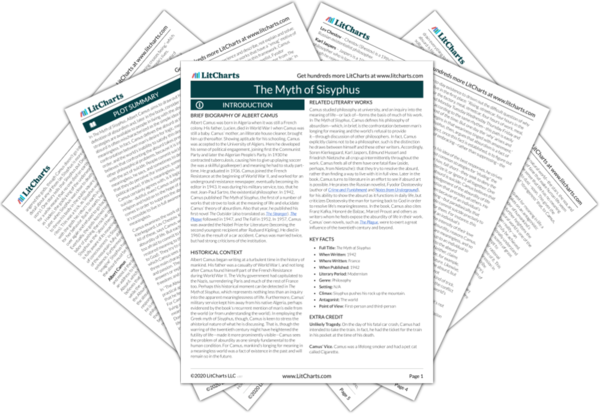Sisyphus Quotes in The Myth of Sisyphus
To the celestial thunderbolts he preferred the benediction of water. He was punished for this in the underworld. Homer tells us also that Sisyphus had put Death in chains. Pluto could not endure the sight of his deserted, silent empire. He dispatched the god of war, who liberated Death from the hands of her conqueror.

Unlock explanations and citation info for this and every other The Myth of Sisyphus quote.
Plus so much more...
Get LitCharts A+Sisyphus woke up in the underworld. And there, annoyed by an obedience so contrary to human love, he obtained from Pluto permission to return to earth in order to chastise his wife. But when he had seen again the face of this world, enjoyed water and sun, warm stones and the sea, he no longer wanted to go back to the infernal darkness. Recalls, signs of anger, warnings were of no avail. Many years more he lived facing the curve of the gulf, the sparkling sea, and the smiles of earth. A decree of the gods was necessary. Mercury came and seized the impudent man by the collar and, snatching him from his joys, led him forcibly back to the underworld, where his rock was ready for him.
I leave Sisyphus at the foot of the mountain! One always finds one’s burden again. But Sisyphus teaches the higher fidelity that negates the gods and raises rocks. He too concludes that all is well. This universe henceforth without a master seems to him neither sterile nor futile. Each atom of that stone, each mineral flake of that night-filled mountain, in itself forms a world. The struggle itself toward the heights is enough to fill a man’s heart. One must imagine Sisyphus happy.

Sisyphus Quotes in The Myth of Sisyphus
To the celestial thunderbolts he preferred the benediction of water. He was punished for this in the underworld. Homer tells us also that Sisyphus had put Death in chains. Pluto could not endure the sight of his deserted, silent empire. He dispatched the god of war, who liberated Death from the hands of her conqueror.

Unlock explanations and citation info for this and every other The Myth of Sisyphus quote.
Plus so much more...
Get LitCharts A+Sisyphus woke up in the underworld. And there, annoyed by an obedience so contrary to human love, he obtained from Pluto permission to return to earth in order to chastise his wife. But when he had seen again the face of this world, enjoyed water and sun, warm stones and the sea, he no longer wanted to go back to the infernal darkness. Recalls, signs of anger, warnings were of no avail. Many years more he lived facing the curve of the gulf, the sparkling sea, and the smiles of earth. A decree of the gods was necessary. Mercury came and seized the impudent man by the collar and, snatching him from his joys, led him forcibly back to the underworld, where his rock was ready for him.
I leave Sisyphus at the foot of the mountain! One always finds one’s burden again. But Sisyphus teaches the higher fidelity that negates the gods and raises rocks. He too concludes that all is well. This universe henceforth without a master seems to him neither sterile nor futile. Each atom of that stone, each mineral flake of that night-filled mountain, in itself forms a world. The struggle itself toward the heights is enough to fill a man’s heart. One must imagine Sisyphus happy.











